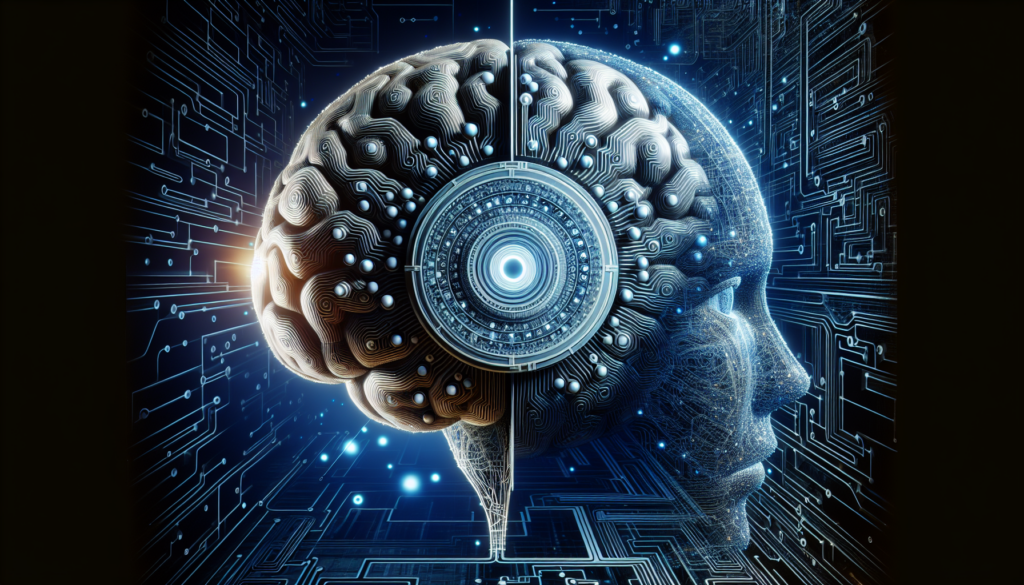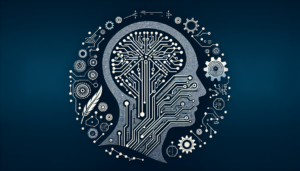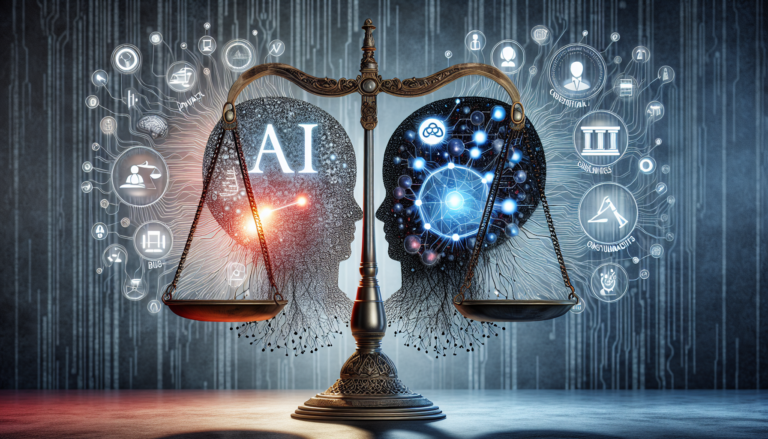If you’re fascinated by the world of artificial intelligence, you’ve likely come across the term “expert systems.” But have you ever wondered what exactly an expert system is in the realm of AI? In simple terms, an expert system is a computer program that mimics the decision-making abilities of a human expert in a specific field. By analyzing vast amounts of data and utilizing rule-based reasoning, expert systems can provide valuable insights, solve intricate problems, and offer recommendations with remarkable accuracy. In this article, we’ll explore the inner workings of expert systems in AI and unearth their potential to revolutionize various industries. Get ready to delve into the fascinating world of AI’s expert systems!

What is an Expert System?
An expert system is a type of artificial intelligence (AI) technology that replicates the knowledge and decision-making abilities of a human expert in a specific domain. It is designed to solve complex problems and make informed decisions by utilizing a carefully curated knowledge base and an inference engine. Expert systems have the capability to provide valuable insights, recommendations, and solutions in various industries and professions, ranging from healthcare to finance to customer support.
Components of an Expert System
Knowledge Base
The knowledge base is the foundation of an expert system. It consists of a collection of domain-specific information, data, rules, and heuristics that encapsulate the expertise of human professionals. This knowledge is typically acquired from subject matter experts and stored in a structured format within the expert system. The knowledge base serves as a reference point for the inference engine to draw conclusions and generate solutions.
Inference Engine
The inference engine is the reasoning component of an expert system. It utilizes the knowledge base to analyze and process information in order to derive conclusions and make informed decisions. By applying logical rules and algorithms, the inference engine is able to deduce solutions, recommend actions, and provide explanations. It uses techniques such as forward chaining and backward chaining to guide the decision-making process based on the available knowledge.
User Interface
The user interface is the interface between the expert system and the end user. It allows users to interact with the expert system, input data, and receive output in a user-friendly manner. The user interface can take various forms, ranging from a command-line interface to a graphical user interface with menus, buttons, and forms. It plays a crucial role in facilitating effective communication and collaboration between the expert system and human operators.
Working of an Expert System
Knowledge Acquisition
The process of knowledge acquisition involves capturing, organizing, and transferring the expertise of human professionals into the expert system’s knowledge base. This can be achieved through various methods, such as interviews, observations, documentation review, and data analysis. Knowledge acquisition can be a time-consuming and iterative process, as it requires understanding the domain, extracting relevant information, and validating the knowledge with experts.
Knowledge Representation
Once the knowledge is acquired, it needs to be represented in a structured and formalized manner within the expert system. This involves encoding the knowledge into a format that the inference engine can understand and process. Common knowledge representation techniques used in expert systems include production rules, frames, semantic networks, and ontologies. The choice of representation method depends on the complexity of the domain and the type of knowledge being represented.
Inference Process
The inference process is the core operation of an expert system, where the inference engine applies logical reasoning and algorithms to draw conclusions from the knowledge base. It starts by matching the available data and facts against the rules and heuristics stored in the knowledge base. Through a series of logical deductions, the inference engine generates new information, reaches decisions, and provides recommendations. The inference process can be iterative and involve backtracking to refine and revise conclusions.
Advantages of Expert Systems
Increased Performance and Efficiency
One of the key advantages of expert systems is their ability to enhance performance and efficiency in decision-making processes. By leveraging the knowledge and expertise of human professionals, expert systems can analyze vast amounts of data, extract relevant insights, and generate accurate solutions. This can lead to faster decision-making, reduced errors, and improved overall performance.
Consistent Decision Making
Expert systems are designed to provide consistent and reliable decision-making capabilities. Unlike humans who can be influenced by emotions, biases, and external factors, expert systems follow predefined rules and logical reasoning. This ensures that decisions and actions taken by expert systems are consistent and based on objective criteria, leading to more reliable outcomes.
Improved Problem-solving
Expert systems excel at solving complex problems and providing innovative solutions. By analyzing data, applying domain-specific knowledge, and utilizing advanced algorithms, expert systems can identify patterns, detect anomalies, and propose novel approaches to problem-solving. They can also consider multiple variables and constraints simultaneously, enabling a more comprehensive analysis of the problem space.
Resource and Cost Savings
Implementing expert systems can lead to significant resource and cost savings for organizations. By automating tasks that are traditionally performed by human experts, organizations can reduce the reliance on expensive expert resources. Expert systems can handle repetitive, mundane, and time-consuming tasks, freeing up human experts to focus on higher-value activities. This results in improved productivity and cost efficiency.

Limitations of Expert Systems
Limited Domain Knowledge
An inherent limitation of expert systems is that they operate within a limited domain of knowledge. They are designed to tackle specific problems within a specific field. If a problem falls outside the domain expertise of the expert system, it may not be able to provide accurate or helpful solutions. Expert systems are highly dependent on the knowledge base, and expanding or updating the domain knowledge can be a challenging and time-consuming process.
Lack of Common Sense Reasoning
While expert systems excel at utilizing domain-specific knowledge and logical reasoning, they often lack the ability to apply common sense reasoning. Human experts possess the unique ability to understand context, interpret ambiguous information, and make intuitive judgments based on common sense. Expert systems struggle to replicate this capability, which can limit their effectiveness in certain scenarios.
High Development and Maintenance Costs
Developing and maintaining expert systems can be a complex and costly endeavor. The process of acquiring and formalizing domain knowledge requires significant time and effort from subject matter experts. Additionally, ensuring the accuracy and relevance of the knowledge base requires continuous updates and maintenance. Hiring and retaining expert system developers and operators can also contribute to the overall cost of implementing and managing expert systems.
Inability to Learn or Adapt
Expert systems are typically static and do not possess the ability to learn or adapt autonomously. They rely on the knowledge base and rules initially programmed into the system, and any updates or changes to the knowledge base require human intervention. This lack of adaptability can be a limitation, especially in dynamic environments where knowledge and best practices evolve over time.
Applications of Expert Systems
Healthcare
Expert systems have found extensive applications in healthcare, assisting in the diagnosis of diseases, recommending treatment options, and providing medical advice. By analyzing patient symptoms, medical records, and medical literature, expert systems can help healthcare professionals make informed decisions, improve patient outcomes, and reduce medical errors.
Manufacturing
In the manufacturing industry, expert systems are used to optimize production processes, monitor quality control, and troubleshoot issues. By analyzing sensor data, historical records, and operational parameters, expert systems can identify inefficiencies, predict maintenance requirements, and suggest process improvements. This can lead to increased productivity, reduced downtime, and improved product quality.
Finance
In the financial sector, expert systems are utilized for tasks such as investment portfolio management, risk assessment, and fraud detection. By analyzing market data, financial trends, and customer profiles, expert systems can provide personalized investment advice, evaluate creditworthiness, and identify suspicious activities. This helps financial institutions make informed decisions, minimize risks, and enhance customer satisfaction.
Customer Support
Expert systems are increasingly being used in customer support and service industries to provide automated assistance and resolve customer queries. By analyzing customer inquiries, knowledge base articles, and historical interactions, expert systems can offer personalized recommendations, troubleshoot common issues, and provide self-service options. This improves customer satisfaction, reduces response times, and frees up customer support agents for more complex inquiries.
Examples of Expert Systems
MYCIN (Medical)
MYCIN is one of the most well-known expert systems in the medical field. Developed in the 1970s, MYCIN was designed to assist with the diagnosis and treatment of bacterial infections. By analyzing patient symptoms and medical data, MYCIN could recommend appropriate antibiotics and dosages, taking into account factors such as drug interactions and patient allergies.
DENDRAL (Chemistry)
DENDRAL, developed in the 1960s, was one of the earliest expert systems and focused on chemical analysis and interpretation. It utilized mass spectrometry data to identify and classify organic compounds. DENDRAL played a significant role in advancing the field of organic chemistry, automating tasks that were traditionally performed manually by chemists.
PROSPECTOR (Geology)
PROSPECTOR is an expert system developed to aid in mineral exploration and resource assessment. By analyzing geological data, satellite imagery, and geophysical measurements, PROSPECTOR could identify potential mineral deposits and provide recommendations for further exploration. It helped geologists streamline the process of identifying valuable mineral resources.
Future of Expert Systems
Integration with Machine Learning
The future of expert systems lies in their integration with machine learning techniques. By combining the reasoning abilities of expert systems with the data-driven capabilities of machine learning algorithms, organizations can create more powerful and adaptable systems. This integration enables expert systems to learn from data, continuously improve their knowledge base, and make more accurate predictions and recommendations.
Enhanced Reasoning and Decision Making
Advancements in natural language processing, knowledge representation, and reasoning techniques will contribute to the enhanced reasoning and decision-making capabilities of expert systems. Future expert systems will be able to understand human language more effectively, interpret unstructured data, and provide more nuanced recommendations. This will further improve their problem-solving abilities and decision-making accuracy.
Wider Adoption in Various Industries
As the benefits and capabilities of expert systems become more widely recognized, their adoption is expected to increase across various industries. Organizations will leverage expert systems to tackle complex problems, optimize processes, and elevate decision-making. With the advancements in technology and the increasing availability of data, expert systems will become a valuable tool for businesses looking to gain a competitive edge.
Ethical Implications of Expert Systems
Transparency and Accountability
The use of expert systems raises ethical concerns surrounding transparency and accountability. As expert systems make decisions and provide recommendations, it is essential to ensure that the decision-making process and the factors influencing the outcomes are transparent and understandable. Users and stakeholders should be able to question and challenge the reasoning behind the recommendations made by expert systems.
Data Bias and Discrimination
Expert systems are only as good as the knowledge base they are built upon. If the knowledge base is biased or incomplete, it can result in discriminatory outcomes. It is crucial to carefully select and curate the knowledge base to minimize biases and ensure fair and equitable decision-making. Additionally, ongoing monitoring and auditing of the expert system can help identify and address any potential biases that may arise.
Replacement of Human Experts
Another ethical implication of expert systems is the potential displacement of human experts. As expert systems become more advanced and capable, there is a possibility that they may replace or reduce the need for human experts in certain domains. This raises questions about the impact on job security, professional expertise, and the role of human judgment and intuition in decision-making processes.
Conclusion
Expert systems play a critical role in leveraging artificial intelligence to replicate the knowledge and decision-making abilities of human experts. By combining a knowledge base with an inference engine, expert systems provide valuable insights, recommendations, and solutions in various industries and professions. While they offer advantages such as increased performance, consistent decision-making, improved problem-solving, and resource savings, they also face limitations such as limited domain knowledge and lack of adaptability. As technology advances, expert systems will continue to evolve and integrate with machine learning, enhancing their reasoning abilities and finding wider applications. However, ethical considerations such as transparency, data bias, and the potential displacement of human experts must be carefully addressed to ensure responsible and beneficial use of expert systems in society.



















